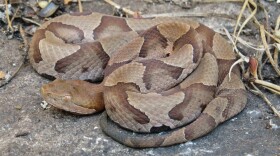Coyotes are everywhere in North Carolina.
C'mon, "everywhere?" Really? Yes, really. To borrow from a commonly used expression: you can't swing a cat outdoors without hitting a coyote around here. (Note: we would never actually swing nor recommend swinging a cat and our sincere apologies to people who don't care to think of cats and coyotes in the same imagery.)
We get into the prevalence of this particular animal species in our new audio special , which explores how and why coyotes migrated from the southwestern United States to our neck of the woods. Now that they're here, they're here to stay.

Coyotes can thrive in a wide variety of habitats, including urban and suburban areas. As my CREEP co-host Laura Pellicer says, "If you live in downtown Raleigh and you think there are no coyotes around you, essentially you are wrong."
Experts say the best way to co-exist is to minimize conflict. So, here is our guide on what to do should you spot a coyote, or feel their presence is a little too close for comfort.
1. Don't panic. Officials with the North Carolina Wildlife Resources Commission say "simply seeing a coyote is not cause for alarm." Coyotes are most visible during pup-rearing season in the spring and later in the fall when young coyotes set off to find new territory.
2. Don't supply them with snacks. Remove potential food sources from your yard, like unsecured garbage, left-over pet food, compost, or fallen fruit and birdseed. Remember, coyotes will eat whatever is available.
3. Mind your yard. Maintain and clear the area around your house of places coyotes might like to congregate. This includes sealing off crawl spaces under porches and sheds, and trimming back brush.
4. Protect your fur babies and buddies. Keep small pets inside, or on a leash when outdoors.
5. Install coyote-proof fencing. This is particularly important if your pet will be unsupervised outside.
6. Don't run. Instead, haze a coyote by waving your arms, yelling, or throwing small objects until it leaves. This will help keep coyotes wary of human interaction. NOTE: Hazing can be less effective during . From February through June, coyotes may be more territorial when defending their den and pups. They may be more vocal, more aggressive toward dogs, or try to escort unwelcome visitors away from their dens. Experts suggest it is best to leave the area calmly and stay away until pup season is over.
The has more tips and information on what to do if you have a problem with a coyote. Visit their Web site or call 866-318-2401. Coyotes are our neighbors here in North Carolina and across the South. Best we all learn how to get along.
Elizabeth Friend and Laura Pellicer are the hosts of , a new documentary from ąĎÉńapp about the shift in human-animal interactions during the COVID-19 pandemic.










